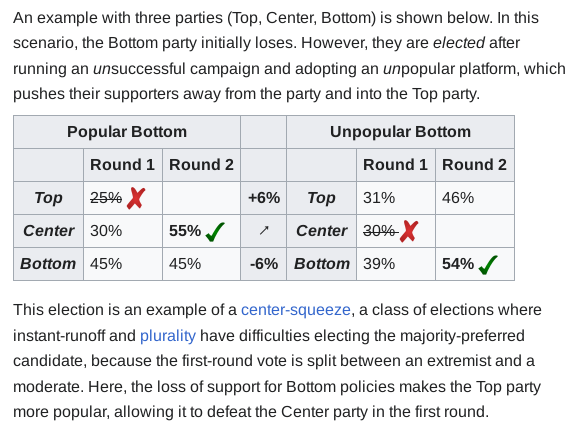No, I’m not putting this in /c/electoralism , for reasons found in the third paragraph
Most people know there’s first-past-the-post and there’s ranked-choice. But I’ve recently learned there’s a much longer list than that, and they all have pros and cons.
Somecomrades would say 🙄yeah bourgeois elections who cares🙄 but that is wrong: the mathematics applies to all voting. It’s the engineering side of the question: “If we have a bunch of people, maybe a hundred, maybe a million, how do we decide what the collective will is in the fairest way?” The name of the field is social choice theory because a social group is trying to make a choice.
You: oh bourgeois elections are a farce lol
Me: exactly and that’s why we need to study how can voting be not a farce
First-past-the-post gets a hard time, and deservedly so. But the people who say “first-past-the-post bad, ranked choice good” are oversimplifying. It turns out there are all these mathematical trade-offs, and it is formally provable that there is no perfect system.
Most ranked choice voting systems* can suffer from a crazy effect where getting more votes makes you lose. The technical name for this is a monotonicity failure because mathematicians are shit with names. (*There are theoretical ranked-choice votings that don’t fail monotonicity, but I don’t know of any being applied in a political system. Companies probably have used them.)

In the ‘Popular Bottom’ Scenario,  gets 45% of the vote and isn’t elected; but in the other scenario he gets 39% and is elected. What happened is he lost supporters to a rival (Top) who eliminated his other rival (Center) for him, so he was able to sneak in.
gets 45% of the vote and isn’t elected; but in the other scenario he gets 39% and is elected. What happened is he lost supporters to a rival (Top) who eliminated his other rival (Center) for him, so he was able to sneak in.
First-past-the-post doesn’t have this problem: more votes is always better. But it has plenty of other problems. The USA system fails the no favorite betrayal criterion catastrophically; that’s the criterion that you should be able to vote for who you like best. Usans “have to” vote for a candidate they hate.
This page summarises it pretty well: https://en.wikipedia.org/wiki/Comparison_of_voting_rules with tables comparing the different traps multi-winner systems fall into and the traps single-winner systems fall into.
Some cool systems:
-
PDF – “This paper discusses the protocol used for electing the Doge of Venice between 1268 and the end of the Republic in 1797”
Anyway, interesting stuff to think about if we design democratic/anarchistic systems for collective decision-making. It wouldn’t have to be electing representatives, it could be voting on policies, same maths either way.


Liberal ideology, universal suffrage is a terrible way to run a real country. Council systems are superior in every way. Democracies based on population count specifically targets and dis-empowers minorities. It also doesn’t properly take into account specific needs of specific groups. direct democracy is primitive and unsuited to delegating authority and politics in countries with millions of people with vastly different ideas and interests between them.
You cannot please everyone, there is no utopia, you’re always going to be stepping on someones toes just a bit when making decisions, especially big ones. Decentralization does not always equal democracy.
This isn’t about universal suffrage or ‘representative’ ‘democracy’, though, and these voting mechanisms are also relevant in council systems.
What do you mean by “council systems”? Do you mean picking people at random (choice by sortilege) and having them vote on issues?
There’s no way around the fact that you have to make a social choice.
That’s what makes it an interesting thing to study. How can we get as many people’s opinions together and approximate some sort of “will of the people”? There’s no such true, objective thing, no “will of the people”, but we have to rough one out in order to build trains, distribute resources. We can’t simply wash our hads of the problem.